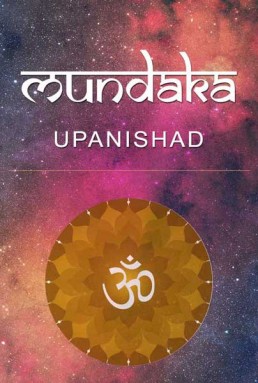न मेधया न बहुना श्रुतेन ।
यमेवैष वृणुते तेन लभ्य-
स्तस्यैष आत्मा विवृणुते तनूं स्वाम् ॥ ३॥
na medhayā na bahunā śrutena .
yamevaiṣa vṛṇute tena labhya-
stasyaiṣa ātmā vivṛṇute tanūṃ svām .. 3..
Mundaka Upanishad Introduction
Mundaka Upanishad Invocation
Mundaka 1 – Chapter 1 – Verse 1
Mundaka 1 – Chapter 1 – Verse 2
Mundaka 1 – Chapter 1 – Verse 3
Mundaka 1 – Chapter 1 – Verse 4
Mundaka 1 – Chapter 1 – Verse 5
Mundaka 1 – Chapter 1 – Verse 6
Mundaka 1 – Chapter 1 – Verse 7
Mundaka 1 – Chapter 1 – Verse 8
Mundaka 1 – Chapter 1 – Verse 9
Mundaka 1 – Chapter 2 – Verse 1
Mundaka 1 – Chapter 2 – Verse 2
Mundaka 1 – Chapter 2 – Verse 3
Mundaka 1 – Chapter 2 – Verse 4
Mundaka 1 – Chapter 2 – Verse 5
Mundaka 1 – Chapter 2 – Verse 6
Mundaka 1 – Chapter 2 – Verse 7
Mundaka 1 – Chapter 2 – Verse 8
Mundaka 1 – Chapter 2 – Verse 9
Mundaka 1 – Chapter 2 – Verse 10
Mundaka 1 – Chapter 2 – Verse 11
Mundaka 1 – Chapter 2 – Verse 12
Mundaka 1 – Chapter 2 – Verse 13
Mundaka 2 – Chapter 1 – Verse 1
Mundaka 2 – Chapter 1 – Verse 2
Mundaka 2 – Chapter 1 – Verse 3
Mundaka 2 – Chapter 1 – Verse 4
Mundaka 2 – Chapter 1 – Verse 5
Mundaka 2 – Chapter 1 – Verse 6
Mundaka 2 – Chapter 1 – Verse 7
Mundaka 2 – Chapter 1 – Verse 8
Mundaka 2 – Chapter 1 – Verse 9
Mundaka 2 – Chapter 2 – Verse 10
Mundaka 2 – Chapter 2 – Verse 1
Mundaka 2 – Chapter 2 – Verse 2
Mundaka 2 – Chapter 2 – Verse 3
Mundaka 2 – Chapter 2 – Verse 4
Mundaka 2 – Chapter 2 – Verse 5
Mundaka 2 – Chapter 2 – Verse 6
Mundaka 2 – Chapter 2 – Verse 7
Mundaka 2 – Chapter 2 – Verse 8
Mundaka 2 – Chapter 2 – Verse 9
Mundaka 2 – Chapter 2 – Verse 10
Mundaka 2 – Chapter 2 – Verse 11
Mundaka 3 – Chapter 1 – Verse 1
Mundaka 3 – Chapter 1 – Verse 2
Mundaka 3 – Chapter 1 – Verse 3
Mundaka 3 – Chapter 1 – Verse 4
Mundaka 3 – Chapter 1 – Verse 5
Mundaka 3 – Chapter 1 – Verse 6
Mundaka 3 – Chapter 1 – Verse 7
Mundaka 3 – Chapter 1 – Verse 8
Mundaka 3 – Chapter 1 – Verse 9
Mundaka 3 – Chapter 1 – Verse 10
Mundaka 3 – Chapter 2 – Verse 1
Mundaka 3 – Chapter 2 – Verse 2
Mundaka 3 – Chapter 2 – Verse 3
Mundaka 3 – Chapter 2 – Verse 4
Mundaka 3 – Chapter 2 – Verse 5
Mundaka 3 – Chapter 2 – Verse 6
Mundaka 3 – Chapter 2 – Verse 7
Mundaka 3 – Chapter 2 – Verse 8
Mundaka 3 – Chapter 2 – Verse 9
Mundaka 3 – Chapter 2 – Verse 10
Mundaka 3 – Chapter 2 – Verse 11
Mundaka 3 – Chapter 2 – Verse 12

Sri Shankara’s Commentary (Bhashya) translated by S. Sitarama Sastri
Com.—If thus the realisation of the atman is the greatest gain of all, it may be thought that means such as study, etc., should be largely employed for its attainment. This text is intended to dispel that notion. This atman which has been explained and whose realisation is the highest object of human desire cannot be attained by means of much study of the Vedas and the Sastras. Similarly not by intelligence, i.e., by a retentive memory of the purport of writings; nor by much heard, i.e., by much hearing. By what then could the Atman be attained is explained. The Paramatman whom this knower wishes to attain, by that seeking alone can that Brahman be attained; not by any other means, because his nature is always attained. What is the nature of this knower’s attainment of the Atman is explained. As pot, etc., reveals its form where there is light, so does the Atman concealed by ignorance reveal his true nature when there is knowledge. The drift is the wish for the realisation of the Atman after renouncing all others is alone the means to the attainment of the Atman.
Mundaka Upanishad – Verse 3 – Mundaka-3-2-3-nāyamātmā – In Sanskrit with English Transliteration, Meaning and Commentary by Adi Shankaracharya (Sankara Bhashya) – Mundaka-3-2-3
